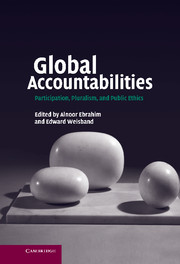Book contents
- Frontmatter
- Contents
- List of tables
- List of figures
- Acknowledgments
- List of contributors
- 1 Introduction: forging global accountabilities
- Part I Public accountability: participatory spheres from global to local
- Part II Experiments in forging NGO accountability: mutuality and context
- Part III Reflective accountability: new directions for participatory practices
- Part IV Global accountability frameworks and corporate social responsibility
- Index
Part I - Public accountability: participatory spheres from global to local
Published online by Cambridge University Press: 22 September 2009
- Frontmatter
- Contents
- List of tables
- List of figures
- Acknowledgments
- List of contributors
- 1 Introduction: forging global accountabilities
- Part I Public accountability: participatory spheres from global to local
- Part II Experiments in forging NGO accountability: mutuality and context
- Part III Reflective accountability: new directions for participatory practices
- Part IV Global accountability frameworks and corporate social responsibility
- Index
Summary
The following chapters explore accountability in public institutions, with special attention to intergovernmental or multilateral organizations. Ngaire Woods leads the section by introducing the reasons for public disaffection with multilateral institutions. The challenge of accountability, as she sees it, is twofold: how to make global institutions more effective and more legitimate. She is critical of reform efforts that seek to increase effectiveness by insulating the institutions from politics (by strengthening the roles of independent experts). Instead, her analysis suggests that political pressures are inescapable, and that a more legitimate process – built on carefully structured forms of participation and representation – could also improve effectiveness and implementation. For participation to have impact, however, it must also be buttressed by enhanced forms of transparency, monitoring, and judicial-style accountability.
In the ensuing chapter, Randall Germain builds on this argument, examining a “hard case” of accountability: the highly specialized agencies and networks that constitute global financial governance. He proposes a rethinking of accountability away from a core emphasis on monitoring and compliance and towards mechanisms that “internalize accountability” within key governance institutions in ways that ensure “dissent and a critical engagement across a range of politically contentious issues are allowed to occur within these institutions themselves.” He calls this a “logic of participation” rather than a “logic of compliance.” While this is no small task among the tight expert circles of central banks, treasuries, and regulators, he provides evidence that the basis for such a rethinking already exists.
- Type
- Chapter
- Information
- Global AccountabilitiesParticipation, Pluralism, and Public Ethics, pp. 25 - 26Publisher: Cambridge University PressPrint publication year: 2007

